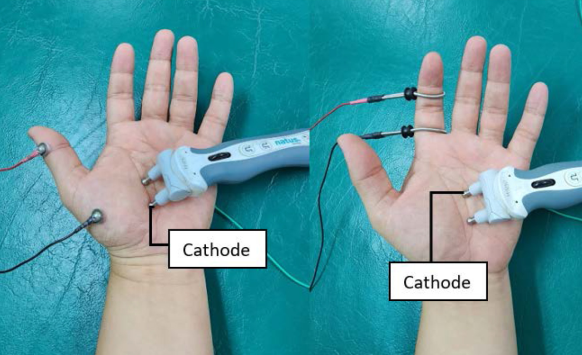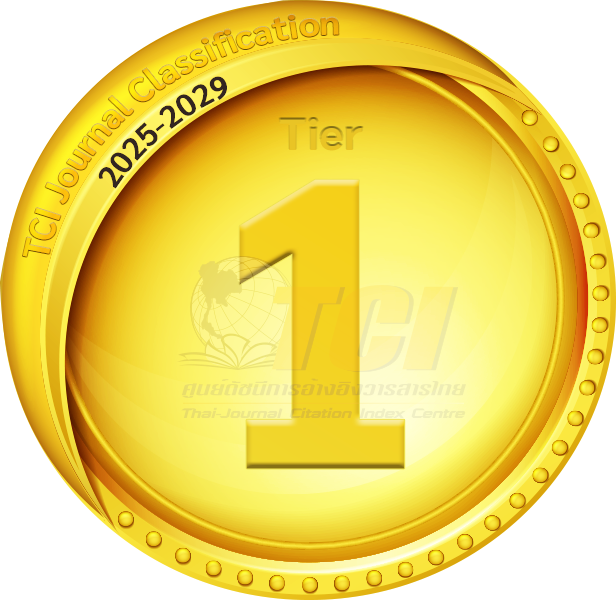DIAGNOSTIC VALUE OF MEDIAN NERVE CONDUCTION VELOCITY ACROSS WRIST AMONG PATIENTS WITH SUSPECTED CARPAL TUNNEL SYNDROME
DOI:
https://doi.org/10.55374/jseamed.v7.159Keywords:
Carpal tunnel syndrome, Median nerve, Nerve conduction velocityAbstract
Background: Carpal Tunnel Syndrome (CTS) is the most prevalent type of compressive neuropathy. At present, electrodiagnosis is considered the gold standard in diagnosing CTS. However, no clear cutoff point has been established regarding the diagnostic value of the median nerve conduction velocity, across the carpal tunnel area, among patients with CTS.
Objectives: This study aimed to determine the cutoff point for patients’ median nerve conduction velocity (NCV), to diagnose CTS among suspected patients, which is determined using electrical stimulations conducted across the carpal tunnel area. The present study also aimed to determine the diagnostic value of the median nerve conduction velocity across the carpal tunnel area, compared with the standard method.
Methods: This cross-sectional study was conducted among 56 participants (106 wrists) suspected of CTS. Motor and sensory NCV across the carpal tunnel was investigated to yield diagnostic value of CTS compared with the standard technique.
Results: The optimal cutoff point in diagnosing CTS using the wrist to midpalm conduction velocity, was 40 m/s (with a sensitivity of 87.04% and specificity of 87.18%) for the sensory nerve conduction study, and
35 m/s (with a sensitivity of 88.06% and specificity of 89.74%) for the motor nerve conduction study.
Conclusion: Our study determined that the optimal cutoff conduction velocities for CTS diagnosis, using the wrist-to-midpalm electrical stimulation method, was 40 m/s for the sensory nerve, and
35 m/s for the motor nerve.
Downloads
Metrics
References
Atroshi I, Gummesson C, Johnsson R, Ornstein E, Ranstam J, Rosen I.Prevalence of carpal tunnel syndrome in a general population. JAMA 1999; 282: 153. DOI: https://doi.org/10.1001/jama.282.2.153
Katz JN, Larson MG, Fossel AH, Liang MH. Validation of surveillance case definition of carpal tunnel syndrome. Am J Pub Health 1991; 8: 189-93. DOI: https://doi.org/10.2105/AJPH.81.2.189
Werner RA. Evaluation of work-related carpal tunnel syndrome. J Occup Rehabil 2006; 16: 207-22. DOI: https://doi.org/10.1007/s10926-006-9026-3
Kimura J. A method for determining median nerve conduction velocity across the carpal tunnel. J Neurol Sci. 1978; 38: 1-10. DOI: https://doi.org/10.1016/0022-510X(78)90240-X
Jablecki CK, Andary MT, Floeter MK, Miller RG, Quartly CA, Vennix et al. Practice parameter: Electrodiagnostic studies in carpal tunnel syndrome. Report of the American Association of Electrodiagnostic Medicine, American Academy of Neurology, and the American Academy of Physical Medicine and Rehabilitation. Neurology 2002:58: 1589-92. DOI: https://doi.org/10.1212/WNL.58.11.1589
Chen S, Andary M, Buschbacher R, Toro DD, Smith B, So Y, et.al. Electrodiagnostic reference values for upper and lower limb nerve conduction studies in adult population. Muscle Nerve 2016; 54: 371-77. DOI: https://doi.org/10.1002/mus.25203
Sucher BM, Schreiber AL. Carpal tunnel syndrome diagnosis. Phys Med Rehabil Clin N Am 25. 2014; 229-247. DOI: https://doi.org/10.1016/j.pmr.2014.01.004
Wang L. Electrodiagnosis of carpal tunnel syndrome. Phys Med Rehabil Clin N Am 2013; 24: 67-77. DOI: https://doi.org/10.1016/j.pmr.2012.09.001
Werner RA, Andary M. Electrodiagnostic evaluation of carpal tunnel syndrome. AANEM monograph: Muscle Nerve 2011; 44: 597-607. DOI: https://doi.org/10.1002/mus.22208
Chang MH, Liu LH, Lee YC, et. al. Comparison of sensitivity of transcarpal median motor conduction velocity and conventional conduction techniques in electrodiagnosis of carpal tunnel syndrome. Clin Neurophysiol 2006; 117: 984-91. DOI: https://doi.org/10.1016/j.clinph.2006.01.015
Walters RJ, Murray NM. Transcarpal motor conduction velocity in carpal tunnel syndrome. Muscle Nerve 200; 24: 966-8. DOI: https://doi.org/10.1002/mus.1096
Preston DC, Shapiro BE. Electromyography and neuromuscular disorders: Clinicalelectrophysiological-ultrasound correlations. 4th ed. London: Elsevier; 2021.
Stevens JC. AAEE minimonograph #26: The electrodiagnosis of carpal tunnel syndrome. Muscle Nerve 1987; 10: 99-113. DOI: https://doi.org/10.1002/mus.880100202
Eftekharsadat B, Ahadi T, Raissi GR, et. al. Validity of current electrodiagnostic techniques in the diagnosis of carpal tunnel syndrome. Med J Islamic Republic Iran 2014: 1-7.
Stevens JC. AAEM minimograph#26. The electrodiagnosis of carpal tunnel syndrome. Muscle Nerve 1997; 20: 1477-86. DOI: https://doi.org/10.1002/(SICI)1097-4598(199712)20:12<1477::AID-MUS1>3.0.CO;2-5
Ongun N, Oguzhanoglu A. Comparison of the nerve conduction parameters in proximally and distally located muscles innervated by the bundles of median and ulnar nerves. Med Princ Pract 2016; 25: 466-71. DOI: https://doi.org/10.1159/000447742
Gunnarsson LG, Amilon A, Hellstrand P, et. al. The diagnosis of carpal tunnel syndrome. Sensitivity and specificity of some clinical and electrophysiological tests. J Hand Surg Br 1997; 22: 34-7. DOI: https://doi.org/10.1016/S0266-7681(97)80011-3
Mallik A, Weir AI. Nerve conduction studies: essentials and pitfalls in practice. J Neurol Neurosurg Psychiatry 2005; 76 (Suppl 2): ii23-31. DOI: https://doi.org/10.1136/jnnp.2005.069138
Campbell WW Jr, Ward LC, Swift TR. Nerve conduction velocity varies inversely with height. Muscle Nerve 1981; 4: 520-3. DOI: https://doi.org/10.1002/mus.880040609

Downloads
Published
How to Cite
Issue
Section
License
The Journal of Southeast Asian Medical Research will hold the copyright to all published articles. The publisher's production department handles copyright forms once a manuscript is accepted and scheduled for publication.







